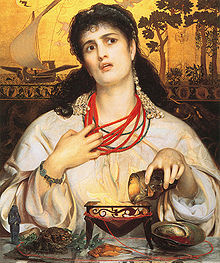Medea, or Exhibit A in why you shouldn't trust people willing to kill their own brother.
Medea, one of the few surviving plays by Euripides focuses on the revenge its titular character takes upon her ex-husband and his trophy wife. Jason abandons his marriage to Medea in order to marry Glauce, the princess of Corinth, out of a desire for higher standing and political power. Medea, who is suspected of magic is exiled by King Creon. She gets an extension of one day to put her affairs in order. The King of Athens visits with Medea and distraught by her situation offers Medea protection from all who would seek to harm her. With protection in place, Medea hatches a plan to seek her revenge against Jason, Glauce and King Creon. She sends a poisoned and enchanted robe and diadem as a wedding gift to Glauce. When Glauce puts them on she is killed, as is her father who comes into contact with the poison while grieving. Upon hearing this news Medea kills hers and Jason's children. Jason rushes to Medea to find out what she has done and to punish her for her crimes, but too late as Medea has taken off in the chariot of Helios for Athens taunting Jason that she has taken away his future family with Glauce and his family with her.
Medea is an character. You want to sympathize with her for much of the play. She is a woman betrayed by the one constant in her life in a society where that was socially acceptable and justified. But she takes her plans for revenge one step too far (or many steps too far really). In the end you can't accept what she has done, it's just too much to bear. Even if the world she finds herself is arrayed against her because of her gender or identity as a non-Grecian (a barbarian), that hardly justifies the murders she commits. She's a villain first, but she's an explained villain which makes it go down just a little easier.

No comments:
Post a Comment